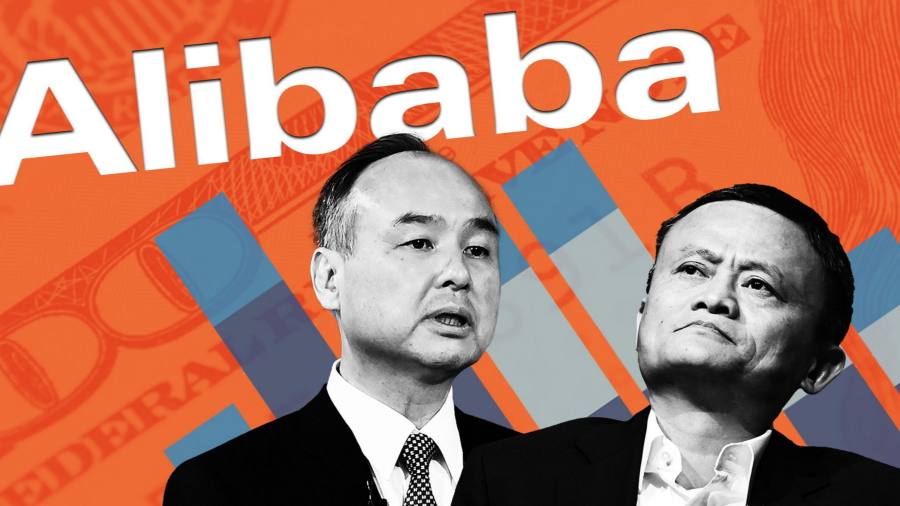SoftBank has moved to sell almost all of its remaining shareholding in Alibaba, limiting its exposure to China and raising cash as the market downturn pummels the value of its technology investments.
The Japanese group, led by billionaire founder Masayoshi Son, has sold about $7.2bn worth of Alibaba shares this year through prepaid forward contracts, after a record $29bn selldown last year.
The forward sales, revealed through a Financial Times analysis of regulatory filings sent by post to the US Securities and Exchange Commission, will eventually cut SoftBank’s stake in the $262bn Chinese ecommerce group to just 3.8 per cent.
The contracts allow SoftBank the option to buy back the shares, but the group has settled previous deals by handing over the stock. The Japanese investor once owned as much as 34 per cent of Alibaba.
SoftBank’s selldown comes at a pivotal moment for the Japanese group, which is planning a blockbuster listing of UK chip designer Arm as it seeks to recover from a spate of failed investments and unprecedented losses. For Alibaba, it will mean the retreat of a longtime backer just as the Chinese group attempts to reinvent itself by splitting into six entities.
SoftBank’s selling spree has come as the Chinese group’s shares have plumbed six-year lows, a disappointing conclusion to one of the most successful technology investments ever made. Son paid $20mn for the bulk of SoftBank’s holding in the fledgling Chinese group more than two decades ago after meeting founder Jack Ma.
“He had no business plan and zero revenue, employees maybe 35 [or] 40,” Son later said on Bloomberg TV. “But his eyes [were] very strong, strong eyes, strong shining eyes. I could tell from the way he talked, the way he looked [at things], he has a charisma, he has a leadership.”
Ma’s penchant for speaking his mind turned into a liability in October 2020 when he criticised China’s state-owned banks at a financial summit in Shanghai. Beijing then suspended the blockbuster IPO of Alibaba’s sister company Ant, as President Xi Jinping launched a campaign to rein in the country’s tech groups.
The crackdown has cut Alibaba’s share price by 70 per cent, leaving SoftBank selling most of its holding at prices on a par with where Alibaba opened for trading in New York eight years ago.
Over the past 14 months, SoftBank reaped, on average, $92 a share from the forward sales of 389mn Alibaba shares, far below the company’s all-time high of $317 a share, according to filings supplied by data provider The Washington Service.
They show SoftBank most recently raised about $4.5bn in February from the forward sales of 46mn shares, coming after the sale of 30mn shares for $2.7bn in late December. SoftBank said the latter sale was not fully completed by the end of December and would be accounted for in its yet to be released financial report for the quarter that ended on March 31.
SoftBank declined to comment on the regulatory filings. But it said the Alibaba transactions reflected its shift to “a defensive mode” to address a more uncertain business environment. “We are bolstering our financial stability by increasing our liquidity on hand by raising cash,” it said.
It added that the additional amount it raised from Alibaba shares would be revealed when it reports its fourth-quarter results in May.
With forward sales, SoftBank generally lends its Alibaba shares to a broker, which sells the shares into the market over a period of days or weeks. The broker takes a fee before returning the proceeds to the Japanese group.
When the contracts come due, SoftBank can either fully relinquish its claim to the shares or pay the broker the market price to repurchase the shares on its behalf.
The filings show most of the recent deals were handled by Barclays, Mizuho Securities and SMBC Nikko Securities, which would earn less than 1 per cent of the proceeds as fees, according to a banker familiar with the deals. Their structure allows SoftBank to delay paying capital gains tax until settlement.
At the end of February, SoftBank had only 98mn shares of Alibaba left to sell, according to the FT’s estimates. On March 30, the group shifted how it held another 22.3mn shares “in light of the potential to use them for financing in the future,” SoftBank said in a statement.
While SoftBank has said that the monetisation of Alibaba shares was to shore up its finances, some investors have seen the move as a desperate means to lift its earnings figures, with analysts projecting a second consecutive year of heavy losses.
SoftBank has put cash harvested from the Alibaba selldown into its Vision Fund II, paid off debt and repurchased shares. Billions are also piling up in cash on its balance sheet, which stood at ¥5.8tn ($43bn) at the end of December, leading to a growing internal debate over how to spend the money, according to a person close to SoftBank.
SoftBank said it would continue to be selective with its investments, citing uncertain market conditions.
“There are divergent views internally on whether we should continue to be a bit more defensive . . . or whether now is the time to get back into investing,” said the person close to SoftBank. “[Executives] are coming around more and more to opening the spigot again.”
Read the full article here




